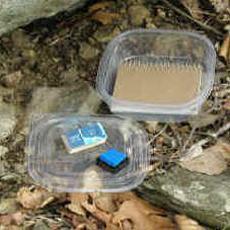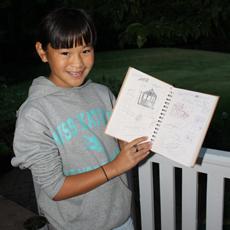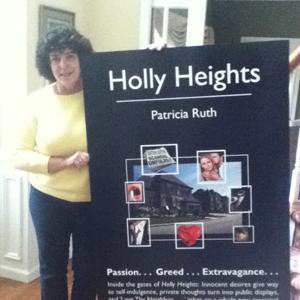
BOB DOUGHTY: Welcome to THIS IS AMERICA in VOA Special English. I'm Bob Doughty.
SHIRLEY GRIFFITH: And I'm Shirley Griffith. This week on our program, we explore letterboxing. And later, we look at what a growing number of writers are doing to get their books published.
(MUSIC)
BOB DOUGHTY: Letterboxing is an activity that requires a container, usually a plastic box. People put a notebook and personal rubber stamp inside. Then they hide it in a public place and offer clues and directions for other letterboxers to search for it.
Those who find it mark their own notebook with the stamp. And they leave an imprint of their stamp in the notebook in the box. Then they put the letterbox back in its hiding place for the next treasure hunter to find.
SHIRLEY GRIFFITH: On this day, James and Nancy Hartigan and their two children are in western Ireland, planning the rest of the day's drive.
JAMES HARTIGAN: "Killimer to Knock around Kilmore to Lab, and then back to Kilkerrin. And then we will hit the Battery at Lackyle, back out, probably hit thecemetery, and then up the road."

The Hartigans have come from Ashland, Virginia, to see family and leave behind a letterbox.
JAMES HARTIGAN: "We have been doing this letterboxing thing for a while. And it is just a kind of neat way of connecting with people, you know, as opposed to sending emails and whatnot. It is something that you have travel to go get."
BOB DOUGHTY: Ten-year-old Sean Hartigan carved the design of a train to use as his personal stamp.
SEAN HARTIGAN: "I definitely like the whole letterbox thing. I am actually kind of hoping for, like, next time we come, eight or nine notes in there."
Sean's older sister, Maggie, has written an introductory passage in the notebook.
MAGGIE HARTIGAN: "I wrote about my hat and about how awesome Ireland is, and I am going to move here when I get rich, along with many other things. [Laughs]"
But, first, the Hartigans have to hide their box. That involves a long drive through the rain over bumpy roads. They arrive after dark at the final resting place for many of James Hartigan's ancestors.
JAMES HARTIGAN: "This is Kilkerrin cemetery. The gravestones would be several hundred years old."
The Hartigans place their letterbox in a crack in the cemetery wall. They have given clues to family members about where to search for it.
SHIRLEY GRIFFITH: Randy Hall is an American software engineer and author of "The Letterboxer's Companion." He says letterboxing began in Devon, England, in 1845.
RANDY HALL: "A gentleman left his calling card out on the moors and said, 'Anyone to find this also do the same or write a little note,' that sort of thing."
Hikers started leaving their cards in remote areas. Directions for finding them spread by word of mouth as one person would tell another. In time, stamps replaced cards. But for more than 100 years, the activity was limited to a small number of people in England.
BOB DOUGHTY: In 1998, a magazine story in the United States introduced letterboxing to many Americans. Its popularity grew with the Internet. The Internet has become the main method for letterboxers to share clues.
Randy Hall says clues in Britain often require people to use a compass to find a letterbox. But Americans often give directions in the form of a puzzle.
RANDY HALL: "It's kind of like setting up treasure hunts. It is like a mental activity, a brainy activity."
Mr Hall is known for his complex puzzles. For example, the only clue he provides for locating a letterbox in North Carolina is a poem written like a Japanese haiku:
Roll's pal in a noose
Sign marks his lupine brother
Pine tree to the north
RANDY HALL: "I like people to have an 'aha' experience when they figure it out. They feel 'Wow, that is really cool. To create a sense of discovery. I do not like it when it is just 'Walk down the path and look under a rock.'"
SHIRLEY GRIFFITH: Some people like to do letterboxing while on vacation. Andrea Wyman and her family make it a part of every vacation they take, including a trip last year to Ohio.
ANDREA WYMAN: "We were letterboxing on Lake Erie and we ended up in a forest area that we probably would not have gone to at all. But the letterbox was hidden within a little campground."
Ms Wyman is a professor at Edinboro University in Pennsylvania. She has designed a course on letterboxing for grandparents and their grandchildren.
She says letterboxing encourages generations to work together while enjoying the outdoors and exploring new places. Also, solving the puzzles and following the clues are good workouts for the brain.
ANDREA WYMAN: "When you are trying to help someone find your letterbox, you are editing, reading and reviewing everything that you write down on your clue list so that you can help someone come and find your hidden book."
BOB DOUGHTY: Her 11-year-old daughter, Hannah, has found many letterboxes. Hannah's stamp is a snowflake. She says letterboxing allows her to do "cool stuff" that does not involve computers.

HANNAH WYMAN: "We went to this park and then it said from this certain tree take 42 third-grader steps. And I was a third-grader at the time, so I got to figure out where the letterbox was."
For Hannah and other letterboxers, the treasure is in the hunt.
(MUSIC)
SHIRLEY GRIFFITH: More and more writers are self-publishing their work. Self-publishing means you not only write the book, but handle production and sales as well. In the past, most publications were self-published. Over time the job of author and publisher became separate.
But finding a publisher can be difficult. So in the last few years, a growing number of new authors have chosen to do it themselves. In fact, industry experts say more books are now self-published than come from traditional publishers.
BOB DOUGHTY: Patricia Ruth's first novel is called "Holly Heights."
PATRICIA RUTH: "It's a slice of suburban life and a story everyone can relate to."
After she wrote and edited the book, her next step was to look for a publisher.
PATRICIA RUTH: "I did try to go the traditional publishing route by sending inquiries to agents and publishers."
It was a long and unsuccessful process.
PATRICIA RUTH: "I'm a member of a very popular club of authors that get rejected by agents and publishers. I'd get rejections from agents. It would come on a strip of paper, maybe two inches long, not even the courtesy of a full page letter. It's outrageous the stuff you get back."

A visit to a book fair showed Patricia Ruth that she did not have to depend on traditional publishers.
PATRICIA RUTH: "I saw that there was so much going on with self-publishing and empowering authors. You know, I felt it was very doable."
SHIRLEY GRIFFITH: The first step was to discover how to do it.
PATRICIA RUTH: "It's easy to start as just Googling the word self-publishing, and you'll see that there is quite a number of companies that do provide self-publishing services. It's really very simple."
One company that provides self-publishing services is CreateSpace, a part of Amazon.com. Libby Johnson McKee is the managing director of CreateSpace.
LIBBY JOHNSON McKEE: "One of the key challenges for authors is coming up with their cover. We've created a tool called a cover creator which allows you to use some of our preformatted templates to create your own cover. Once your title is finished and ready for production, we then produce that book, print on demand."
Print on demand avoids the problem of printing more copies of a book than an author can sell. But Patricia Ruth says marketing a book is often more difficult than writing it.
PATRICIA RUTH: "My recommendation is to start local. In my community, my local bookstore has a table for local authors. So it's a matter of getting them to pick your book, maybe do a book signing. I did one. You want to write a press announcement and send it to local radio, TV and newspapers."
BOB DOUGHTY: Lorin Rees of the Rees Literary Agency says self-publishing has its limitations. Mr Rees represents authors to traditional publishers.
LORIN REES: "Obviously self-publishing gives a lot of control to authors and allows them to fulfill their goals without having to go through a pretty difficult, tiresome and lengthy process and rejections. However, there are limitations to self-publishing, particularly distribution, packaging, editorial support and credibility."
Margaret Hollister self-published "Inheriting China." Her book is a memoir about growing up as the daughter of missionaries in China in the 1920s and 30s. She agrees with Lorin Rees about the limitations of self-publishing.
MARGARET HOLLISTER: "It's impossible, very, very, stressful, so much work and so expensive. Maybe you write naturally. Maybe that's a natural thing for you. Publishing and formatting a book and trying to find a market, all that, that is not natural. You need to learn that just as you would learn a profession."
SHIRLEY GRIFFITH: David Minckler is an editor who helped Margaret Hollister publish her book last year. His advice to other authors who want to follow her example?
DAVID MINCKLER: "I'd say they would have to learn some software and be pretty good at it. They should know enough to be able to scan pictures, organize a text and proofread."
Digital technology makes it easier for authors to self-publish. But David Minckler says traditional publishers are here to stay.
DAVID MINCKLER: "A lot of self-published books seem to be pretty trivial and really not of much interest to a wide audience. So if you're talking about a wide audience, I think established publishers will continue."
BOB DOUGHTY: Libby Johnson McKee at CreateSpace agrees, but says self-publishing is also here to stay.
LIBBY JOHNSON MCKEE: "Since 2002, the growth of independently published books is over 8,000 percent. So there is really a movement in the industry, because anyone who wants to tell their story can be out there. I think that trend of democratization of the publishing process will continue."
(MUSIC)
SHIRLEY GRIFFITH: Our program was written and produced by Brianna Blake, with reporting by Susan Logue and Faiza Elmasry. I'm Shirley Griffith.
BOB DOUGHTY: And I'm Bob Doughty. Do you like letterboxing? Have you ever self-published a book? Tell us about it at voaspecialenglish.com. While you're there, you can find transcripts, MP3s and podcasts of our programs. We also have activities for people learning English. Join us again next week for THIS IS AMERICA in VOA Special English.
cemetery: a place for burying the dead; a graveyard 墓地;公墓
lupine: characteristic of or resembling a wolf 狼的;凶残的;贪婪的
doable: capable of being done; practical 可做的,可行的
Arkansas treasure hunt links people with lost cash
Indian police guard temple treasure haul worthbillions
For Kay Ryan, poetry is 'the most private form of communication'
(来源:VOA 编辑:Rosy)
